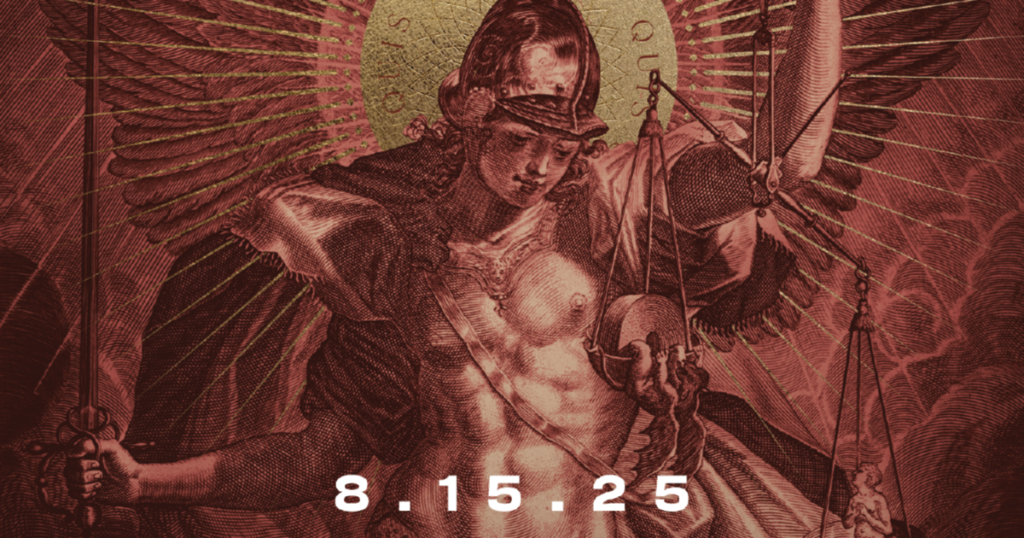As we prepare for the Exodus Marian Consecration beginning April 28th, we invite you to read Fr. Boniface’s full introduction to The Fruit of Her Womb: 33 Day Preparation for Total Consecration to Jesus (Sophia Institute Press, 2023), which we will be going through in the Exodus app. The full introduction is published here with permission.
St. Louis-Marie Grignion de Montfort set forth a revolution of Christian spirituality when he first taught about Marian consecration and presented his thirty-three-day plan to prepare souls for this big step in their relationship with Jesus.
What is this consecration? St. Louis de Montfort described it as being a form of “slavery” to Mary. This slavery means that we do nothing without her. We choose not to have a will apart from Mary’s. St. Louis de Montfort invited us to wear a chain to signify our close bond with her, and he elaborated the consequence of that bond: we share everything with Mary, including our prayers, our intentions, our actions, and our merits. Fundamentally, he said that we choose to become totally dependent on Mary: we receive everything through her and share everything with her.
At first this idea may sound radical, and it may even sound a little scary or seem like a lot of work. As we come to understand the way the spirit of the world has infected our thinking, however, and as we get in touch with our own woundedness, we gradually discover that this consecration is a merciful gift from Heaven and a sweet path of salvation. In fact, it is better than we could have ever hoped for! What this consecration teaches us is that we have a sweet, loving, perfect Mother who actually wants to live in this intense relationship with us. And so, if we accept Mary’s invitation to this relationship, we will find all the healing and happiness we have always longed for.
In order to understand our need and desire for a deep relationship with Mary, we have to take a step back and reflect on how we got to where we are.
The principal consequences of Original Sin are a fearful grasping after independence and a repeated search for a security that is in our own control. In the beginning, however, God made us for relationship: first of all with Himself—“then the Lord God formed man of dust from the ground, and breathed into his nostrils the breath of life; and man became a living being” (Genesis 2:7)—and then also with each other—“It is not good that the man should be alone; I will make him a helper fit for him” (Genesis 2:18). These relationships were deeply ruptured by the Fall, when man and woman sought to become gods without God (Genesis 3:1–7). All efforts to achieve immortality through medicine, science, or magic are a consequence of this first sin. Original Sin is behind all our efforts to earn love through our accomplishments or to control our lives through our own power. It is the source of all our unhappiness, emptiness, and fear. It is fundamentally a denial of our being—we did not create ourselves, and we do not have sole power over our destiny. We simply cannot exist without God; trying to do so is a contradiction that splits us in two.
The problem is that living in relationship requires trust, and our trust has been broken over and over, starting with our first infant cry that went unanswered. Our psyches are blistered with broken trust. To whom can we turn for healing?
Fortunately, God does not leave us alone in the wilderness of isolation, nor does He tell us to “get over it” or simply move on, ignoring our hurts. Further, He does not expect us to find our way home on our own, which would only exacerbate the problem. Rather, God reveals Himself as a Father who is trustworthy, and He has sent us His Son to adopt us into His family and to bring us home to our Father in Heaven. This is the adventure of salvation.
In this adventure, we must relearn trust and dependence. And so, because it is not good for the man to be alone (i.e., without human relationships), Jesus also adopts us into His Holy Family, which means that in addition to the imperfect human parents who gave us life, God has also sent us the Blessed Virgin Mary as our perfect human Mother and St. Joseph, Mary’s most chaste spouse, as our human father.
Mary fills in any gaps left in us by our birth-mother’s limitations. She is the first of the redeemed. She is without sin from the moment of her conception. She will never fail us, forget us, abandon us, or forsake us. She will never break our trust. In this way, she teaches us to trust again and helps to heal our wounds. St. Joseph is the human father God made for Jesus. He perfectly formed the humanity of Jesus as He matured, that is, as He “increased in wisdom and in stature, and in favor with God and man” (Luke 2:52). For that reason, St. Joseph is also the best human father for us. He builds on all the good things our dads have done, and he fills out all the holes they left when their limitations prevented them from being the fathers we needed them to be.
Now we are in a better position to understand Marian consecration. Most fundamentally, it is a choice to be a child like Jesus. In other words, we are choosing to be a child of Mary and Joseph. But a child can still be willful and wander away, so our dependence must be more radical: we are invited to be the infant of Mary and Joseph. Think of Jesus’ birth in Bethlehem. Jesus did not provide for Himself, but rather He let Mary and Joseph feed Him and hold Him and even change His diapers. Think of the Flight into Egypt and how helpless Jesus was. He did not protect Himself but rather let Himself be carried to safety by Mary and Joseph, who saved Him from Herod’s wrath.
St. Louis de Montfort invited us to go even one step further. He wrote:
Mary received from God a unique dominion over souls enabling her to nourish them and make them more and more godlike. St. Augustine went so far as to say that even in this world all the elect are enclosed in the womb of Mary, and that their real birthday is when this good mother brings them forth to eternal life. Consequently, just as an infant draws all its nourishment from its mother, who gives according to its needs, so the elect draw their spiritual nourishment and all their strength from Mary. (The Secret of Mary, no. 14)
We therefore must be even more helpless than an infant: we must let ourselves be held in the most perfect embrace of the most loving Mother as a baby in the womb. This is the radical quality of our trust, our abandonment to the one who always perfectly lives in accord with the will of God. Mary is the perfect Mother who will only nourish the child in her womb with the best of foods and who turns every squirming movement of that tiny child into a beautiful expression of love for God.
Of course, there is no greater “slavery” than being in the womb. A baby in the womb is totally helpless and totally dependent on the mother. A baby in the womb has no will other than the will of the mother. And yet the concept of being in our mother’s womb holds none of the negative connotations that “slavery” has. While we recognize that slavery is in the Bible and it is not problematic in a theological sense, we also understand that, especially in light of our American history with slavery, the term “slavery” may distract our readers from the essence of the consecration. Marian consecration is first and foremost about love and trust, and it carries none of the harmful or ambiguous connotations of the term “slavery.” We have therefore reframed the Total Consecration to Mary, without losing anything, to be no longer described as slavery but as the perfect embrace and safe protection a mother provides for an infant in her womb.
In the following pages, we will embark on a thirty-three-day preparation for Marian consecration after the model given to us by St. Louis de Montfort. We will spend the first twelve days emptying ourselves of the spirit of the world. Then we will spend a week focused on self-knowledge, then a week focused on knowledge of Mary, and finally a week focused on knowledge of Jesus. After thirty-three days of preparation, we will be ready to make a consecration on the thirty-fourth day.
We recommend spending at least ten minutes every day on this preparation for consecration: this includes time to read the teaching provided, to reflect on it, and to recite some prayers to ask for God’s grace in this process. The suggested prayers for each day are arranged alphabetically by title at the end of this book.
Whether you are making this journey for the first time or are renewing your consecration, we hope that you will open your heart to the possibility of profound conversion.
We conclude with an encouraging word from St. Louis de Montfort that reminds us that the paradise of Mary’s womb is a place of wonders especially fashioned according to each one’s weaknesses, a place in which we are only expected to be a little child. Our thirty-three days of preparation open up to us the secret of Mary, in whom we draw closest to our loving God. There is a place for everyone in the bosom of our loving Mother:
Happy, indeed sublimely happy, is the person to whom the Holy Spirit reveals the secret of Mary, thus imparting to him true knowledge of her. Happy the person to whom the Holy Spirit opens this enclosed garden for him to enter, and to whom the Holy Spirit gives access to this sealed fountain where he can draw water and drink deep draughts of the living waters of grace. That person will find only grace and no creature in the most lovable Virgin Mary. But he will find that the infinitely holy and exalted God is at the same time infinitely solicitous for him and understands his weaknesses. Since God is everywhere, He can be found everywhere, even in Hell. But there is no place where God can be more present to His creature and more sympathetic to human weakness than in Mary. It was indeed for this very purpose that He came down from Heaven. Everywhere else He is the Bread of the strong and the Bread of angels, but living in Mary He is the Bread of children. (The Secret of Mary, no. 20)
Fr. Boniface Hicks, O.S.B., is a Benedictine monk of Saint Vincent Archabbey in Latrobe, Pennsylvania. He joined the Benedictines in 1998 and was ordained to the priesthood in 2004. In 2019, Fr. Boniface and his spiritual director—Fr. Thomas Acklin—started a spiritual direction formation program through St. Vincent Seminary’s Institute for Ministry Formation. Fr. Boniface was the spiritual guide for the Exodus 90 program in 2024.




